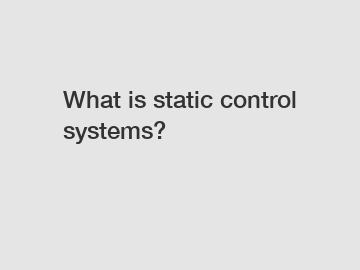What is static control systems?
What is Static Control Systems?
Static control systems are essential in many industries to prevent damage caused by static electricity. These systems help dissipate and control electrostatic charges, ensuring the safety of personnel, protecting sensitive equipment, and preventing fires and explosions. But what exactly are static control systems, and how do they work?
Static control systems work by neutralizing or eliminating the electric charge present on various objects, such as floors, work surfaces, chairs, equipment, and clothing. These systems typically consist of three components: grounding, ionization, and monitoring.

Grounding is a critical part of static control systems. It involves establishing a connection between the equipment and the ground, allowing the electrostatic charges to flow safely. Grounding ensures that all conductive elements are at the same electric potential, reducing the risk of electric discharge. This is achieved through measures like using conductive flooring or floor mats, incorporating grounded workstations, and connecting equipment to grounding points.
Ionization is another essential aspect of static control systems. It involves the use of ionizers to neutralize charges on objects. An ionizer emits ions, either positive or negative, which then neutralize the charges on the surface of objects. Air ionizers are commonly used, which blow ionized air into the environment to neutralize charges. This process eliminates the potential for electrostatic discharge and prevents damage to sensitive equipment or products.
Monitoring plays a crucial role in static control systems as it ensures their effectiveness. Monitoring devices, such as static meters or electrostatic field meters, are utilized to measure static charges and monitor ambient conditions. By regularly monitoring the static charges, companies can identify potential problems and take appropriate actions to maintain a controlled environment.
Now that we understand the components of static control systems let's look at their importance in different industries:
1. Electronics Industry:
Static control systems are indispensable in the electronics industry, where electronic components and devices are particularly sensitive to electrostatic discharges. Without proper static control measures, ESD (Electrostatic Discharge) can damage or degrade electronic circuits, leading to costly failures in electronic devices.
2. Pharmaceutical Industry:
In the pharmaceutical industry, static control systems are crucial to maintaining the quality and integrity of products. Electrostatic charges can cause contamination in production processes or damage sensitive pharmaceutical substances. By implementing static control measures, companies can prevent product losses, ensure product consistency, and comply with stringent quality standards.
3. Manufacturing Industry:
In manufacturing, static control systems are vital for various reasons. They prevent static charges from attracting and accumulating dust or other particles on product surfaces, ensuring cleanliness. Static control systems also safeguard employees by eliminating the risk of electric shocks and maintaining a safe working environment. Additionally, these systems help prevent fires or explosions in environments with flammable materials.
4. Printing Industry:
Static control systems are extensively used in the printing industry to prevent issues caused by static electricity. Static charges can cause misfeeds, print defects, or the adhesion of dust and dirt to paper or other substrates. By effectively controlling static charges, printing companies can improve print quality, reduce waste, and enhance overall productivity.
In conclusion, static control systems play a vital role in various industries to prevent damage caused by static electricity. By grounding objects, implementing ionization techniques, and monitoring static charges, these systems ensure the safety of personnel, protect sensitive equipment, and prevent potential hazards like fires or explosions. Whether it is in the electronics, pharmaceutical, manufacturing, or printing industry, static control systems are a necessity to maintain product quality, enhance productivity, and comply with industry standards. So, next time you encounter static electricity, remember the significance of static control systems in keeping our world safe and efficient.
The company is the world’s best pcba for telecommunication, communication pcba, mintecelec.com supplier. We are your one-stop shop for all needs. Our staff are highly-specialized and will help you find the product you need.
146
0
0


Comments
All Comments (0)